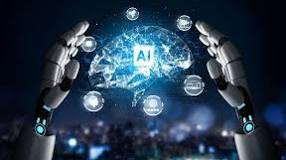Understanding Artificial Intelligence: What Is It?
Artificial Intelligence (AI) is a term that has become increasingly common in today’s technological landscape. But what exactly is AI, and why is it so significant?
Defining Artificial Intelligence
At its core, Artificial Intelligence refers to the development of computer systems that can perform tasks typically requiring human intelligence. These tasks include learning, reasoning, problem-solving, perception, language understanding, and more.
The Evolution of AI
The concept of AI has been around for decades. Early AI research focused on symbolic methods and problem-solving. Over time, advancements in computing power and data availability have led to the rise of machine learning—a subset of AI where systems learn from data to improve their performance on specific tasks.
Machine Learning and Deep Learning
- Machine Learning: This involves training algorithms on large datasets to recognize patterns and make decisions. It’s used in applications like email filtering and recommendation systems.
- Deep Learning: A more advanced form of machine learning that uses neural networks with many layers (deep neural networks). It’s particularly effective for complex tasks such as image and speech recognition.
Applications of AI
The applications of AI are vast and varied, impacting numerous sectors:
- Healthcare: AI assists in diagnosing diseases, personalizing treatment plans, and managing patient data.
- Finance: It helps in fraud detection, algorithmic trading, and risk management.
- Transportation: Autonomous vehicles use AI for navigation and safety features.
- E-commerce: Personalized recommendations enhance customer experiences through AI-driven insights.
- Agriculture: Precision farming techniques utilize AI to optimize crop yields while minimizing resource use.
The Future of AI
The potential for AI continues to grow as technology advances. Researchers are exploring new frontiers such as general artificial intelligence—systems that possess the ability to understand or learn any intellectual task a human can perform. While this remains a long-term goal, the impact of current AI technologies is already profound.
Ethical Considerations
The rise of AI also brings ethical considerations to the forefront. Issues such as privacy concerns, bias in algorithms, job displacement due to automation, and ensuring transparency in decision-making processes are critical discussions shaping the future development of artificial intelligence.
Conclusion
Artificial Intelligence represents one of the most transformative technologies of our time. Understanding what it is and how it works enables us to harness its potential while addressing the challenges it presents. As we continue to integrate AI into various aspects of life, ongoing dialogue about its implications will be essential for responsible advancement.
7 Advantages of Artificial Intelligence: Boosting Efficiency, Innovation, and More
- 1. Enhances Efficiency
- 2. Improves Decision-Making
- 3. Personalization
- 4. Innovation
- 5. Cost Savings
- 6. Predictive Capabilities
- 7. Scalability
7 Concerns About Artificial Intelligence: From Job Displacement to Ethical Dilemmas
- 1. Job Displacement
- 2. Bias in Algorithms
- 3. Privacy Concerns
- 4. Dependence on Technology
- 5. Ethical Dilemmas
- 6. Lack of Transparency
- 7. Potential for Misuse
1. Enhances Efficiency
Artificial Intelligence significantly enhances efficiency by automating repetitive and time-consuming tasks, allowing businesses and individuals to focus on more strategic and creative endeavors. By leveraging AI, organizations can streamline operations, reduce human error, and process large volumes of data quickly and accurately. This leads to increased productivity as AI systems can operate continuously without fatigue, handling tasks such as data entry, customer service inquiries, and inventory management with precision. As a result, companies can allocate resources more effectively and respond swiftly to market demands, ultimately gaining a competitive edge in their respective industries.
2. Improves Decision-Making
Artificial Intelligence significantly enhances decision-making processes by swiftly analyzing vast amounts of data to provide informed insights. In industries such as finance, healthcare, and logistics, AI systems can process complex datasets far more efficiently than humans, identifying patterns and trends that may not be immediately apparent. This capability allows businesses to make strategic decisions with greater confidence and speed, optimizing operations and improving outcomes. By leveraging AI’s analytical power, organizations can anticipate market changes, personalize customer experiences, and enhance overall productivity while reducing the likelihood of human error in critical decision-making scenarios.
3. Personalization
Artificial Intelligence has revolutionized personalization by tailoring experiences to individual preferences in various sectors such as marketing, healthcare, and entertainment. In marketing, AI analyzes consumer behavior and preferences to deliver targeted advertisements and product recommendations that resonate with each user. In healthcare, AI-driven systems customize treatment plans based on a patient’s unique medical history and genetic information, leading to more effective care. Similarly, in entertainment, AI algorithms curate personalized content playlists on streaming platforms, ensuring that users discover music, movies, or shows that align with their tastes. This level of personalization enhances user satisfaction by providing relevant and engaging experiences tailored specifically to individual needs and interests.
4. Innovation
Artificial Intelligence is a powerful catalyst for innovation, driving the development of new technologies and solutions that were previously unimaginable. By leveraging AI, industries can automate complex processes, enhance decision-making, and uncover insights from vast amounts of data. This capability not only streamlines existing operations but also opens the door to entirely new possibilities, such as personalized medicine in healthcare or predictive maintenance in manufacturing. AI’s ability to learn and adapt enables the creation of smarter products and services, fostering a culture of continuous improvement and creativity. As AI continues to evolve, its role in pushing the boundaries of what is possible will only expand, leading to breakthroughs that can transform societies and improve quality of life across the globe.
5. Cost Savings
One of the significant advantages of artificial intelligence is its potential for cost savings. By automating routine tasks and optimizing processes, AI can significantly reduce operational expenses for businesses. For instance, AI-powered systems can handle repetitive tasks such as data entry, customer service inquiries, and inventory management more efficiently than human workers, freeing up employees to focus on higher-value activities. Additionally, AI algorithms can analyze large datasets to identify inefficiencies and suggest improvements, leading to better resource allocation and reduced waste. As a result, companies that implement AI technologies often experience increased productivity and lower costs, giving them a competitive edge in the market.
6. Predictive Capabilities
Artificial Intelligence’s predictive capabilities are one of its most significant advantages, allowing organizations to anticipate trends, behaviors, and outcomes with remarkable accuracy. By analyzing vast amounts of data, AI algorithms can identify patterns and correlations that might be invisible to the human eye. This ability is invaluable across various sectors; for instance, in finance, AI can forecast market trends and help investors make informed decisions. In healthcare, predictive analytics can foresee disease outbreaks or patient health deterioration, enabling proactive measures. Retailers use AI to predict consumer behavior and optimize inventory management. Overall, AI’s predictive power not only enhances efficiency but also empowers decision-makers to plan strategically and mitigate potential risks before they materialize.
7. Scalability
One of the significant advantages of artificial intelligence is its scalability, which allows AI systems to adjust in size and capacity according to demand. This adaptability makes AI particularly valuable in a wide range of scenarios, from handling fluctuating workloads in data centers to managing customer service interactions during peak times. By automatically scaling up resources when demand increases and scaling down when it decreases, AI systems ensure efficient resource utilization and cost-effectiveness. This flexibility not only enhances performance but also provides businesses with the agility needed to respond swiftly to changing market conditions and consumer needs.
1. Job Displacement
One significant con of artificial intelligence is job displacement, as AI automation has the potential to replace certain jobs by automating tasks that were traditionally performed by humans. As AI systems become more sophisticated and capable of handling complex processes, industries such as manufacturing, transportation, and even services are seeing a shift in labor dynamics. Routine and repetitive tasks are particularly susceptible to automation, leading to concerns about unemployment for workers in these roles. While AI can increase efficiency and productivity, it also necessitates a transition for affected workers who must adapt by acquiring new skills or transitioning into different fields. This shift underscores the importance of investing in education and retraining programs to help the workforce adapt to an evolving job market driven by technological advancements.
2. Bias in Algorithms
Bias in algorithms is a significant concern in the realm of artificial intelligence, as AI systems often mirror and even amplify the biases inherent in their training data. When datasets used to train these systems contain prejudices or skewed perspectives, the AI can inadvertently learn and propagate these biases in its decision-making processes. This can lead to unfair outcomes in critical areas such as hiring practices, law enforcement, and lending decisions. For instance, if an AI system is trained on historical data that reflects societal biases against certain groups, it may continue to favor one demographic over another, perpetuating inequality. Addressing this issue requires careful consideration of data sources and the implementation of strategies to detect and mitigate bias throughout the AI development process.
3. Privacy Concerns
As artificial intelligence becomes more integrated into daily life, privacy concerns have emerged as a significant issue. AI systems often rely on vast amounts of data to function effectively, which can include sensitive personal information. This increased data collection raises questions about how securely this information is stored and who has access to it. There is also the risk that AI could be used to analyze personal data in ways that infringe on individual privacy rights without users’ explicit consent. As AI technology continues to evolve, ensuring robust data protection measures and transparent policies will be crucial in addressing these privacy concerns and maintaining public trust.
4. Dependence on Technology
The increasing reliance on artificial intelligence systems poses a significant concern regarding the potential reduction in human skills and decision-making capabilities. As AI technologies become more integrated into everyday tasks, there is a risk that individuals may become overly dependent on these systems, leading to a decline in critical thinking and problem-solving abilities. This dependency could result in a diminished capacity to perform tasks independently, as people might defer to AI for decisions that they would have previously made themselves. Furthermore, an overreliance on technology could lead to complacency, where users fail to question or verify the outputs provided by AI systems, potentially overlooking errors or biases inherent in the algorithms. Addressing this issue requires a balanced approach that emphasizes the enhancement of human skills alongside technological advancements, ensuring that AI serves as a tool to augment human capabilities rather than replace them.
5. Ethical Dilemmas
One of the significant concerns surrounding artificial intelligence is the ethical dilemmas it presents, particularly in sensitive areas such as healthcare and law enforcement. In healthcare, AI systems can assist in diagnosing diseases and personalizing treatment plans, but they also raise questions about patient privacy and data security. Additionally, reliance on AI for critical medical decisions could lead to situations where human oversight is diminished, potentially resulting in life-altering consequences if errors occur. In law enforcement, AI technologies like facial recognition and predictive policing can enhance efficiency but also risk infringing on civil liberties and perpetuating biases present in the data they are trained on. These complex ethical challenges necessitate careful consideration and the establishment of robust guidelines to ensure that AI technologies are used responsibly and equitably.
6. Lack of Transparency
One significant drawback of artificial intelligence is the lack of transparency, often referred to as the “black box” problem. Many AI models, especially complex ones like deep neural networks, operate in ways that are not easily interpretable by humans. This opacity makes it challenging to understand how these systems arrive at specific decisions or predictions. As a result, users and stakeholders may find it difficult to trust AI-driven outcomes, particularly in critical areas such as healthcare, finance, and criminal justice. The inability to fully comprehend the decision-making processes of AI systems raises concerns about accountability, bias, and fairness. Addressing this issue requires ongoing research into explainable AI (XAI) techniques that aim to make AI systems more transparent and their operations more understandable to humans.
7. Potential for Misuse
The potential for misuse is a significant concern when it comes to artificial intelligence. As AI technology becomes more advanced and accessible, there is an increasing risk that it could be used for harmful purposes. This includes the development of autonomous weapons, surveillance systems that infringe on privacy rights, or algorithms that perpetuate bias and discrimination. Additionally, AI systems could be exploited by malicious actors for cyberattacks or misinformation campaigns. The unintended consequences of AI misuse can have far-reaching impacts on society, highlighting the importance of establishing robust ethical guidelines, regulatory frameworks, and oversight mechanisms to ensure that AI technologies are developed and deployed responsibly.



